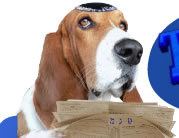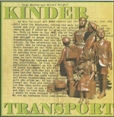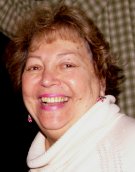 |
 |
|
 |
WOLFE'S
WORDS |
|||||
  Bottom Bottom |
What's in "Der Nomen?" |
Issue: 10.05 |
||||
|
It has been said that a man has three names: the name he inherits, the name his parents give him, and the name he makes for himself. At a briefing with reporters, Homeland Security Secretary, Janet Napolitano, and Agricultural Secretary, Tom Vilsack, pleaded with the media, and others, to start identifying the Swine Flu as the H1N1 flu. And Israeli officials suggested renaming it Mexican flu, saying the reference to pigs is offensive to Muslim, and Jewish, sensitivities over pork. Speaking of names, Tom and Ray Magliozzi are "der oytomobile" meyvins (experts) on the radio program, "Car Talk." At the end of the program, listeners hear the Car Talk Credits--the official staff credit...and what a sordid collection of staff! Here are some examples: Chicken
Soup Provisioner Director of
Elder affairs Jewelry
Appraiser Lighting
Expert Staff
Gossip Columnist Staff
Mortician Bowling
Coach Chairman,
Federal Lubrication Board Dog
Trainer Videographer, Tel-Aviv Office Timing
Director And now to the name, Michael Fein. No, not Michael Fein from "GantsehMegillah.com." A different Michael Fein. I recently had the pleasure of reading Zalman Velvel's book, "The King of Shabbos and Other Stories of Return" (Square One Publishers). I highly recommend it! One story is titled, "Heshy With His Hand Out" and here's where we meet the "anderer" Michael Fein. Here's the inspirational story: It was a monumental Monday morning. The time was 8:00 A.M. The place was Bais Simcha, the only Orthodox synagogue in the small town of Sunshine, Florida. It was there that Michael Fein, and Heshy Pupchik, collided into each other like matter, and antimatter. Heshy Puupchik was the poorest Jew in town, and no one had ever seen him work either. Winter, spring, summer, and fall, Heshy looked the same. He wore old tennis shoes without socks, dark- brown pants, and a short-sleeve shirt that had once been white. He weighed nearly three hundred pounds, but he carried it well when he decided to carry it. His grey eyebrows were so bushy a blue jay could nest in them. These eyebrows contrasted starkly with his almost completely bald head, which he topped off with a worn black yarmulke. It was a mystery how Heshy kept the yarmulke from slipping off, but he did. Heshy's gray beard was long, and scraggly, with his moustache covering most of his lips. His ears were extra large, and his eyes were the widest, saddest pair anyone had ever seen. They changed color with the quality of light, going from blue to brown to gray-black. No matter what color they appeared, people sensed that great need lurked behind them. When Heshy extended his right hand, looked up to the heavens, and said, "Baruch Hashem," Blessed is God, the good folks of Sunshine automatically put money in his outstretched palm. Even Rabbi Levi succumbed to Heshy, and the rabbi could not spare it on his meager salary. Everyone gave to Heshy, except Michael Fein, the president of Bais Simcha and the richest Jew in town. Michael Fein had no respect for Heshy, who seemed unwilling to try his hand at any honest day's work. It was a rare occurrence when Michael Fein slowed down long enough to smile. He was often seen speeding around in his black Lexus or glancing impatiently at his Rolex, waiting for those who interrupted him to spit out what they wanted. On this Monday morning, Michael was in foul spirits. He woke up with a pounding headache, only to discover an empty bottle of aspirin in the medicine cabinet. When he combed his hair, several strands fell in the bathroom sink, and he could see his scalp to the back of his head. He stared at the mirror, and a tired, old man of forty-eight stared back. Michael's Monday morning headache came in part from a lack of sleep over the weekend. He spent those precious two days moping around his heavily mortgaged home, dwelling on the millions he'd lost in the stock market the preceding Thursday. Accounting fraud was discovered in a blue-chip company Michael was heavily invested in. Michael's 100,000 shares of stock went from 50 dollars a share, down to 6 cents. His retirement fund went from 5 million dollars to 6,000 dollars, less than a month's mortgage payment on his grand house. The nest egg he had nurtured and tended to for twenty years was shattered in a single day. (Note from Marjorie) Remember the Yiddish sentence, "Shpor, shpor, kumt der shvarts yor un nemt alts gor" (You save and you save and then a lean year comes and takes away everything.) (The story continues) Michael went to shul to pray for help from God, only to be confronted by Heshy, with his hand out, when he reached the front door. "Baruch Hashem," Heshy greeted him cheerily, standing at his favorite spot. "Get a job!" Michael sneered. "I would...but I am unable to work," Heshy answered, looking to his empty palm. "You mean unwilling." Michael felt an acid anger boil to surface. He needed someone to get angry at, to blame for his bad luck, and Heshy was the perfect target. "I am unwilling because I am unable," Heshy stammered. "You are unable because you are fat and lazy!" Heshy winced, and then grew silent. He lowered his head and looked down at the ground. When he looked back up, huge tears had formed in his eyes. Though it was a foul Monday morning, perhaps the foulest of Michael's life, when he looked into Heshy's eyes, those tears stopped him like a wind-up clock with a broken spring. Michael had never really looked at Heshy. He saw him at the entrance, but didn't take the time to look. Heshy's eyes, so large and suffering forced open his tough lawyer's heart. Michael realized that as much pain as he was feeling, there was another human being who also carried a burden. "I'm sorry, Heshy...I didn't mean that....I'm having a very bad day...Please forget what I just said....please..." Michael pulled his wallet from his pants pocket, and searched through it for a dollar, or perhaps a five. He frowned when he discovered he only had two one-hundred dollar bills. "I don't have anything small," Michael apologized, closing his wallet. "Baruch Hashem," Heshy answered back. He raised his sad eyes, and smiled at Michael, and that look combined with his innocent smile, worked the miracle that was about to ensue. Michael shrugged, "Oh, what the heck." He opened his wallet once again, withdrew one of the bills, and placed it in Heshy's hand. When Heshy saw the one followed by two zeros on the bill, he grabbed Michael's hand and held on to it. "Thank you! Baruch Hashem! Thank you!" "It's okay," Michael said, trying to disentangle the large, hairy hand that engulfed his. "Wait...I want to give you a bracha, Mr. Fein." "You? Give me a blessing?" Michael asked, tugging at his trapped hand. Heshy had a grip like a circus strongman. "Yes, a special bracha!" Michael stopped struggling, and stood there listening impatiently as Heshy looked up to the heavens, and whispered in Hebrew. When he was almost done, he looked at Michael. "Are you healthy, Mr. Fein? Would you also like a special bracha for health?" "No, I am okay." His headache was not gone. "Perhaps a family member is sick?" "No, Heshy. They are all as healthy as horses." "How about money, Mr. Fein. How are things in the prosperity department?" Michael was about to say he was okay there, too, except for the first time in twenty years, he felt scared, and out of control. His life savings were gone! Gone! He didn't have the strength to take on the punishing, aggravating duties of an attorney for another twenty years. He was worn out by other people's problems, and their ungrateful attitudes. "Heshy, I'm broke." It was Michael's turn to look down at the ground. He looked down for a long time, Heshy still holding his hand. When he looked back up, there were tears in Michael's eyes. "A man works his whole life, Heshy, and it can all be taken away on one lousy Thursday." "Yes...Baruch Hashem." And then Hershy did something he had never done before. He put the hundred dollar bill back into the lawyer's hand. "Here, Mr. Fein. Perhaps you should keep this." Michael was shocked. He stared at the bill. One hundred dollars. It was barely enough to pay for a meal at the better restaurants in Sunshine where his family had grown used to eating. How much pleasure would he get from this hundred dollar bill? He looked at Heshy Pupchik. A one-hundred-dollar windfall would bring this man joy for many days. Michael put the bill back in Heshy's hand. "I would rather have your bracha, Heshy." "Are you sure, Mr. Fein?" Heshy asked, clutching the bill. "Yes." Heshy squeezed Michael's hand tighter, looked to the skies, and prayed fervently. When he let go of Michael's hand, both men smiled at each other. "Michael turned toward the front door. At the last moment, Heshy jumped in front of him and held it open. Michael was about to walk inside, but instead, stopped at the threshold. Heshy looked at him, puzzled. "Aren't you going in?" Heshy asked. "What about you?" "Me?" "Yes, aren't you coming inside, Heshy?" "To tell you the truth, Mr. Fein, I didn't think you wanted to pray with someone like me." Michael shrugged, and then walked inside. Heshy went back to his spot and waited for the next member of the congregation to approach from the parking lot. As Heshy was waiting, he heard the front door creak open behind him. He turned around and looked. Michael
Fein was holding the door open, bidding Heshy to enter. |
||||||
| See Marge's website | ||||||

|
Subscribe (free) to the Gantseh Megillah. The Gantseh Megillah and GantsehMegillah.com are designed and hosted by HannaVisioN






 In Yiddish, "der nomen"
means the name.
In Yiddish, "der nomen"
means the name.








 Printer
friendly page
Printer
friendly page